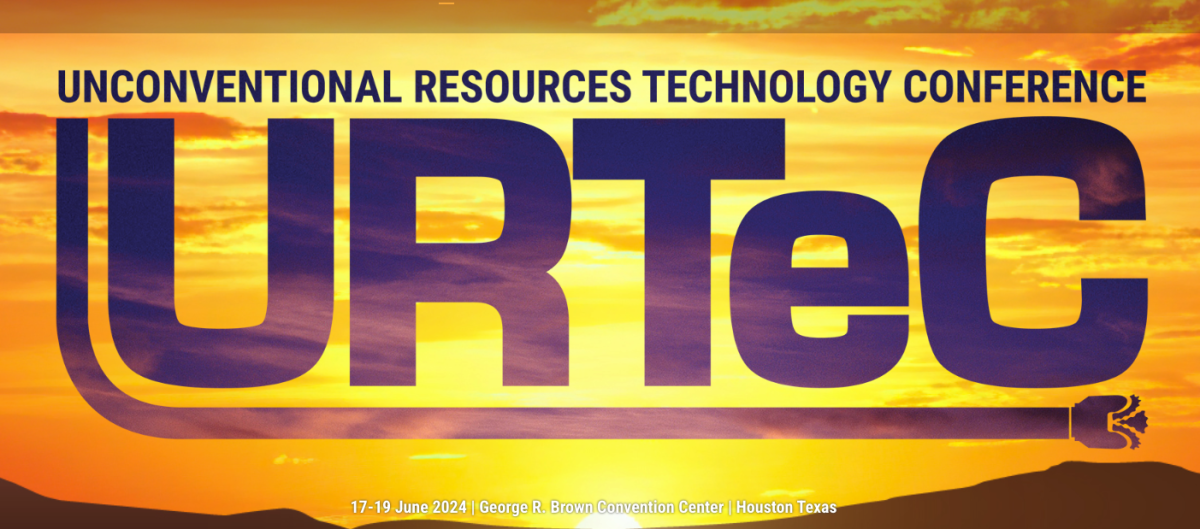
URTeC 2024 – Save-The-Date : The Integrated Event for Unconventional Resource Teams The Unconventional Resources Technology Conference June 17-19 – Houston
This Event Reminder is Sponsored by:
The Integrated Event for Unconventional Resource Teams
The Unconventional Resources Technology Conference (URTeC) is a premier event focused on the latest science and technology applied to exploration and development of unconventional resources, with special emphasis on integration of the technical/professional disciplines.
URTeC continues to be the best opportunity you’ll have to exchange information, formulate strategic ideas, and solve problems to manage and optimize your unconventional resource plays.
In 2020 URTeC entered the digital space, responding proactively to COVID-19 and low energy prices, with an innovative virtual event featuring more than 250 technical talks, panel discussions, and team presentations. In 2021, URTeC implemented a fully hybrid meeting format with an in-person aspect at the George R. Brown Convention Center in Houston, Texas along with a dynamic online experience.
2022 marked the tenth anniversary of URTeC with a fully in-person meeting in Houston, Texas that rebounded with an overwhelming success. The event gathered more than 4,000 attendees from around the globe while featuring more than 330 technical presentations, and 160 exhibitors showcasing the latest technology and services.
URTeC is excited to announce that the 2024 meeting is returning to the George R. Brown Convention Center, in Houston, Texas, 17–19 June. Plan now to attend and help celebrate what the collaboration and integration of our multiple disciplines has achieved across the unconventional sector over the years.
URTeC is comprised of three sponsoring organizations:
Society of Petroleum Engineers (SPE)
American Association of Petroleum Geologists (AAPG)
Society of Exploration Geophysicists (SEG)
Plus three endorsing organizations:
American Rock Mechanics Association (ARMA)
Society of Petroleum Evaluation Engineers (SPEE)
Society of Petrophysicists and Well Log Analysts (SPWLA)
Technical Theme and Subcategories
Theme 1: Operators’ Forum: Case Studies Highlighting the Multidisciplinary Approach to Exploration, Appraisal, Pilot Tests, and Development
- Well Spacing to Field Development and Stacked Pay Development Strategies
- Quantifying, Mitigating and/or Overcoming Parent-Child effects
- Case Studies Highlighting Optimizing Completion, Perforation, and Stimulation Strategies
- Refracturing to Improve Performance and Economics
- A focus on Key Unconventional Basins and their Development
- EOR in Unconventionals
- Sustainability, Rapid Industry Change, and the Social License to Operate
- Business Aspects of Unconventional Plays
- New Materials and Innovative Technologies Application (Case Studies)
Theme 2: Advanced Formation Evaluation
- Drivers for Understanding Reservoir Quality
- Rock-Fluid and Fluid-Fluid Interactions – PVT data acquisition/analysis
- High and Low Field NMR Applications
- Advances in Special Core Analysis and Core-Flood Testing
- Emerging Petrophysical Evaluations
- Petrophysical Property Modeling for Geocellular Modeling
- Pore-Network Imaging and Fluid Flow Modeling
- New Materials and Innovative Technologies
Theme 3: Geological Characterization and Evaluation Spanning the E&P Lifecycle
- Emerging Geological Evaluations, Tools and Workflows for Prospectivity Assessment
- Application of Geological Tools to Unlock Added Value: Is There an Upside?
- How do you Access the Acreage and Running Room? Tips and Knowledge Sharing of Geological Subsurface Characterization
- Geological Drivers Behind Stimulated and Drainage Rock Volume: Observations, Lessons Learned and Strategies for Assessment
- What’s in Your Rock: Geological Integration that Impacted Go-Forward Business Decisions
- How Do You Approach Uncertainty and Risk Analysis: Sharing Experiences, Lessons Learned and Best Practices?
- International and Emerging Challenges of Unconventional Resources
Theme 4: Geophysical Reservoir Analysis
- High-Resolution Geophysical Acquisition, Processing, and Imaging
- Pore Pressure Modeling and Prediction
- Predicting Rock Properties using Seismic Inversion
- Uncertainties in Geophysical Workflows
- Quantifying Completions Efficiency using DTS & DAS
- Quantifying Hydraulic Fracture Propagation using Microseismic Data
- Integration of DTS/DAS with Microseismic and Seismic Data
- Quantitative Imaging and Interpretation of Natural and Induced Fractures and their effect on production
- New and Innovative Technologies in Reservoir Imaging and Characterization
- Integrating Seismic Data with Multivariate Production Prediction
Theme 5: Geomechanics – The Intersection of Geoscience and Engineering
- Rock and Hydraulic Fracture Modelling
- Geomechanics in Well Design, Construction, and Drilling
- Diagnostics and Monitoring with Geomechanical Models
- Production Simulation, Forecasting and Optimization
- Infill Drilling and Refracturing; Applications and Lessons Learned
- Impact of Hydraulic Fracturing and Drawdown on Well Productivity
Theme 6: Organic and Inorganic Geochemistry including Fluid-Rock Interactions
- Geochemistry in Reservoir Characterization
- Integrated Geochemical Investigations
- Fluid-Rock Interactions
Theme 7: Applications of Data Science
- Subsurface characterization, applied case studies and business implementation
- New approaches, workflows and best practices; case study examples
- Applications in Reserves Estimation and Production Forecasting
- Impact to Drilling and Completion(s)
Theme 8: Unlocking the Production and Recovery Potential
- Reservoir Production and Recovery Mechanisms
- Flow and Phase Behavior for Tight Oil and Shale Oil/Shale Reservoir Systems
- Pressure Transient Testing, DFIT, and Well Testing
- Shale Facilities and Artificial Lift Optimization
- Case Studies and Implementation in IOR/EOR
- EGR (Enhanced Gas Recovery) Methods in Unconventionals
- Surfactants and Nanofluids for EOR in Unconventionals
- New Materials and Innovative Technologies
- EOR in Unconventionals
Theme 9: Reserves Estimation and Production Forecasting
- EUR and Performance Prediction: Decline Curve Analysis and Beyond
- Reserves Implications: Guidelines and Considerations
- Future of Production Forecasting: Data-Driven Models and Physics-Based Solutions
- Type Well Profiles, early data estimates, and impacts of lifecycle updates
- Well Spacing and Well Interference Impact
- Production Diagnostics — Understanding the Big Picture on Production Forecasting



Recent Comments